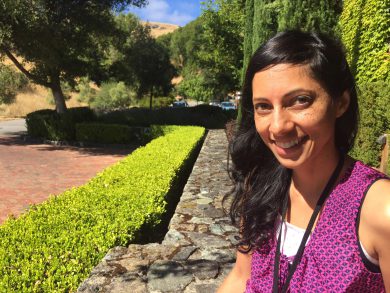Songwriting and composing can sometimes be labours of love, but they’re always hard work, nonetheless.
You have to do some sort of creative work to write a song or compose a piece, and there are as many ways to do that work as there are music creators in the world.
In honour of Labour Day, SOCAN would like to share a few quotes, from interviews with our writer and composer members, about some of the qualities that come up repeatedly as facilitators of their work: persistence, patience, vulnerability, and solitude.
Sarah McLachlan, on the value of solitude in nature to complete her lyrics:
“I have a dog, and I hike every day in the woods… and whatever kernels of ideas I have, I just go into the woods, usually by myself, and just sort of work on the lyrics. I’ve got so much music, a ton of music, but lyrics are the things that are tough, where I have to really turn my brain off; turn all the other things off in my brain to really focus on them. Being in the woods, in nature, is paramount in being able to just relax, and settle in, and do nothing but focus in on that one task.”
Jessie Reyez, on the challenge of writing songs from a vulnerable place:
“The only time it’s difficult is… [when I’m] anticipating my loved ones feeling my pain. Because I know they hurt different, they hurt differently for me. That makes me hesitant about putting things out sometimes. But I do it anyway, and they support me anyway. So I’m grateful.”
Grandson, on the persistence involved in co-writing the 2019 SOCAN Songwriting prize-winning song “Blood/Water”:
“That one in particular was like trying to get a big fish on board… It took a million different forms, sonically, and we just couldn’t crack it… Kevin Hissink and I got it to a place (about 60 percent done) we were excited about, where I had all the lyrics, but finally I came up with what would become the verse melody, and the buildup melody, but we needed something to put it over the top… We sent Chester (Krupa Carbone) the demo, and he built out the rest of it.”
Buffy Sainte-Marie, on the patience required for her songs to reach timely fruition for release:
“I had political problems in the U.S. [in the ’70s] so that I couldn’t get any airplay. But I made a lot of great records during that time, that didn’t get heard. So some of those songs showed up on [her 2015 Polaris Prize-winning album] Power in the Blood… As a songwriter, if you have a medicine, and the flu hasn’t hit yet, it’s very smart to hang on to the medicine until it can do some good.”

Marie-Mai (Photo: Malina Corpadean)
Marie-Mai, on the super-vulnerable songs of her 2018 Elle et moi album:
“Elle et moi is an incredibly personal album from beginning to end. Definitely my most personal album ever… This record is like my diary while I was going through all of this turmoil… an open window on my life during these last few years. Each song reveals a little more about me, and I know people will have questions after listening to them. Did she really do that? Did she really feel that way?”
Christine Jensen, multiple JUNO Award-winning jazz artist, on the listening effort and solitude required for her composing process:
“When I start the process of composition, the first thing I look for, or try to get my ears around, is an idea that I know I can develop. That might mean checking out a lot of different music, whether it’s jazz, or world, or contemporary classical, or pop, or folk… Then I need a place by myself, usually, to just process some thoughts and get some seeds of ideas going.”
Nicolas Gémus, 22, on the persistence required to write the songs on his critically-acclaimed 2019 debut album, Hiboux:
“I was 15 when I wrote the first song on the album… A song will happen spontaneously through a chorus or a verse, then I’ll take a step back and find that song’s heart and soul. And then begins the tortuous process of finishing that song. ‘L’amour et la peur’ came out in three hours; but most of the time, I need three hours to write a single sentence.”

Amritha Vaz
Leonard Sumner, on the patience required to create his 2019 JUNO-nominated album Standing in the Light:
“It was a six-year process… Everything from song selection for recording, to the actual “playlist” of track order, to every little detail I went over. It was a super-long process. I had the album title for years before I actually had the songs ready for it.”
Amritha Vaz, screen composer, on the persistence required as she started out in film scoring
“When you start working as an assistant, you might be exceptionally lucky to land a writing gig, but more often, you’re earning your way to that position. Perhaps because I hadn’t formally studied film scoring, I was keenly aware of my huge learning curve, so I was just as eager to learn how to set-up Logic templates and synch video, as I was to soak up musical insights… There was so much to learn!… And there’s the art of graciously letting it all go when what you’ve tried [for a score] doesn’t land, and you’re back to square one.”
High Klassified, Montréal-based hip-hop producer, and Weeknd/Future co-writer, on the value of solitude to focus on writing:
“My girlfriend lives in the Canadiens tower (downtown condo), and that’s a real headache to me. All that noise and entertainment bothers me. In (my basement studio in) Laval, I can concentrate on music and think about nothing else. That’s how I manage to create.”